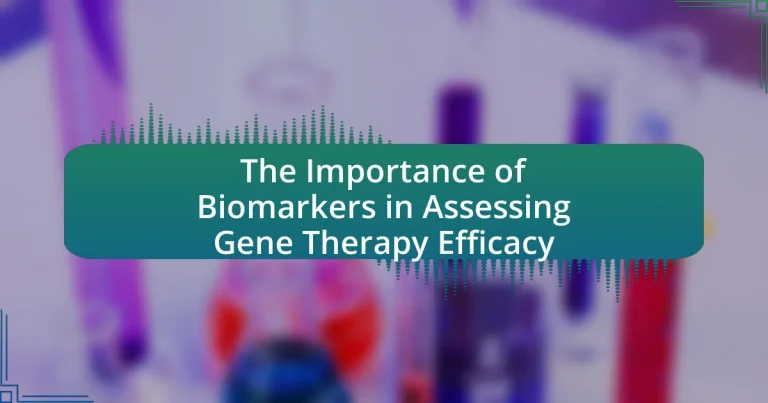Biomarkers are biological indicators that play a critical role in assessing the efficacy of gene therapy by providing measurable data on treatment responses at the molecular level. This article explores the various types of biomarkers used in gene therapy, including genetic, protein, and functional biomarkers, and their significance in monitoring therapeutic effects and patient outcomes. It also discusses the processes involved in biomarker identification and validation, the challenges faced in their application, and the future directions for biomarker development in personalized medicine. Additionally, the article highlights the importance of adhering to best practices and ethical considerations in biomarker research to enhance the integration of biomarkers in clinical trials.

What are Biomarkers and Why are They Important in Gene Therapy?
Biomarkers are biological indicators, often measurable substances or characteristics, that signify a biological state or condition, particularly in the context of disease. In gene therapy, biomarkers are crucial for assessing the efficacy of treatments, as they provide objective data on how well a therapy is working at a molecular level. For instance, specific biomarkers can indicate whether a gene has been successfully delivered and expressed in target cells, or if the intended therapeutic effects are being achieved. Studies have shown that using biomarkers can enhance the precision of treatment evaluations, leading to more tailored and effective gene therapy approaches.
How do biomarkers function in the context of gene therapy?
Biomarkers function in gene therapy by serving as measurable indicators of biological processes, disease states, or responses to therapeutic interventions. They enable the assessment of gene therapy efficacy by providing objective data on how well the therapy is working, such as changes in gene expression, protein levels, or clinical outcomes. For instance, in clinical trials, specific biomarkers can be used to monitor the therapeutic effects of gene editing technologies like CRISPR, allowing researchers to evaluate the success of the treatment in real-time. This application of biomarkers is supported by studies demonstrating that tracking specific biomarkers correlates with improved patient outcomes, thus validating their role in optimizing gene therapy strategies.
What types of biomarkers are commonly used in gene therapy assessments?
Commonly used biomarkers in gene therapy assessments include genetic biomarkers, protein biomarkers, and functional biomarkers. Genetic biomarkers, such as specific gene mutations or expression levels, help evaluate the presence of targeted genetic alterations. Protein biomarkers, including therapeutic protein levels or immune responses, provide insights into the biological activity of the gene therapy. Functional biomarkers, which assess physiological changes or clinical outcomes, are crucial for determining the therapeutic efficacy and safety of the treatment. These categories of biomarkers are essential for monitoring the effectiveness and safety of gene therapies in clinical settings.
How do biomarkers help in monitoring therapeutic responses?
Biomarkers help in monitoring therapeutic responses by providing measurable indicators of biological processes or pharmacological responses to a treatment. They enable clinicians to assess the effectiveness of therapies, such as gene therapies, by tracking changes in specific biological markers associated with disease progression or treatment efficacy. For instance, in cancer treatment, biomarkers like tumor markers can indicate how well a therapy is working by showing reductions in tumor size or changes in metabolic activity. Studies have shown that using biomarkers can lead to more personalized treatment plans, as they allow for real-time adjustments based on individual patient responses, ultimately improving patient outcomes.
What role do biomarkers play in evaluating gene therapy efficacy?
Biomarkers play a critical role in evaluating gene therapy efficacy by providing measurable indicators of biological processes, disease progression, and therapeutic response. They enable researchers and clinicians to assess the impact of gene therapy on target genes and pathways, facilitating the monitoring of treatment outcomes. For instance, specific biomarkers can indicate successful gene transfer, expression levels of therapeutic genes, and the biological effects of the therapy on the disease state. Studies have shown that the presence of certain biomarkers correlates with improved clinical outcomes, thereby validating their use as reliable endpoints in clinical trials.
How can biomarkers indicate the success of gene therapy treatments?
Biomarkers can indicate the success of gene therapy treatments by providing measurable evidence of therapeutic effects at the molecular, cellular, or physiological levels. For instance, specific biomarkers can reflect the expression of the therapeutic gene, the reduction of disease-related proteins, or improvements in clinical symptoms. Studies have shown that monitoring biomarkers such as circulating nucleic acids or protein levels can correlate with treatment outcomes, thereby validating the efficacy of the gene therapy. For example, in clinical trials for spinal muscular atrophy, changes in biomarkers like SMN protein levels have been directly associated with patient improvement, demonstrating the utility of biomarkers in assessing treatment success.
What challenges exist in using biomarkers for efficacy assessment?
Challenges in using biomarkers for efficacy assessment include variability in biomarker expression, lack of standardization, and difficulty in correlating biomarker levels with clinical outcomes. Variability can arise from biological differences among patients, which may lead to inconsistent results across studies. The absence of standardized protocols for biomarker measurement can result in discrepancies in data interpretation. Furthermore, establishing a direct link between biomarker levels and therapeutic efficacy is complex, as not all biomarkers reliably predict clinical responses, complicating the assessment of gene therapy effectiveness.

How are Biomarkers Identified and Validated in Gene Therapy?
Biomarkers in gene therapy are identified through a combination of genomic, proteomic, and metabolomic analyses, which help in pinpointing specific biological indicators associated with therapeutic responses. Techniques such as high-throughput sequencing, mass spectrometry, and bioinformatics are employed to discover these biomarkers, allowing researchers to correlate them with clinical outcomes. Validation of these biomarkers involves rigorous testing in clinical trials, where their predictive value and reliability are assessed against established clinical endpoints. For instance, the FDA emphasizes the need for biomarkers to demonstrate a clear relationship with treatment efficacy, as seen in the approval of therapies like CAR T-cell treatments, where specific biomarkers were crucial for patient selection and monitoring.
What processes are involved in biomarker discovery for gene therapy?
Biomarker discovery for gene therapy involves several key processes, including identification, validation, and clinical application. The identification process typically utilizes high-throughput screening techniques to discover potential biomarkers associated with specific genetic modifications or therapeutic responses. Following identification, validation is conducted through rigorous testing in preclinical models and clinical trials to ensure the biomarker accurately reflects the therapeutic effect and is reproducible across different populations. Finally, the clinical application phase integrates the validated biomarkers into clinical practice, enabling the assessment of gene therapy efficacy and patient stratification. These processes are essential for developing reliable biomarkers that can guide treatment decisions and improve patient outcomes in gene therapy.
How do researchers ensure the reliability of identified biomarkers?
Researchers ensure the reliability of identified biomarkers through rigorous validation processes, including reproducibility studies and cross-validation with independent cohorts. These methods involve testing biomarkers in diverse populations and under various conditions to confirm their consistency and accuracy. For instance, the use of standardized protocols and statistical analyses helps to minimize variability and bias, thereby reinforcing the reliability of the biomarkers. Additionally, adherence to guidelines set by organizations such as the FDA and EMA for biomarker qualification further supports the credibility of the findings.
What criteria are used to validate biomarkers in clinical settings?
The criteria used to validate biomarkers in clinical settings include analytical validity, clinical validity, and clinical utility. Analytical validity assesses the biomarker’s ability to accurately and reliably measure the target biological marker. Clinical validity evaluates the biomarker’s correlation with clinical outcomes, such as disease presence or progression. Clinical utility determines the biomarker’s usefulness in guiding treatment decisions and improving patient outcomes. These criteria ensure that biomarkers provide meaningful information that can enhance the effectiveness of gene therapy and other clinical interventions.
What technologies are utilized in biomarker analysis for gene therapy?
Technologies utilized in biomarker analysis for gene therapy include next-generation sequencing (NGS), quantitative polymerase chain reaction (qPCR), and enzyme-linked immunosorbent assay (ELISA). NGS allows for comprehensive genomic profiling, enabling the identification of genetic alterations associated with therapeutic responses. qPCR is employed for precise quantification of specific RNA or DNA sequences, facilitating the assessment of gene expression levels. ELISA is used to measure protein biomarkers, providing insights into the biological effects of gene therapy. These technologies collectively enhance the understanding of gene therapy efficacy by enabling the monitoring of therapeutic targets and biological responses.
How do genomic and proteomic technologies contribute to biomarker identification?
Genomic and proteomic technologies significantly enhance biomarker identification by enabling the comprehensive analysis of genetic and protein expression profiles. Genomic technologies, such as next-generation sequencing, allow for the identification of genetic variations and mutations associated with diseases, while proteomic technologies, including mass spectrometry, facilitate the detection and quantification of proteins that may serve as indicators of disease states. For instance, studies have shown that specific gene mutations identified through genomic analysis can correlate with the presence of certain proteins in the proteome, thereby establishing a link between genetic alterations and potential biomarkers. This integrated approach not only improves the accuracy of biomarker discovery but also aids in the development of targeted therapies, ultimately enhancing the assessment of gene therapy efficacy.
What role does bioinformatics play in biomarker analysis?
Bioinformatics plays a crucial role in biomarker analysis by enabling the integration and interpretation of complex biological data. It facilitates the identification of potential biomarkers through computational methods that analyze genomic, transcriptomic, and proteomic data, allowing researchers to uncover correlations between biomarkers and therapeutic responses. For instance, bioinformatics tools can process large datasets from high-throughput sequencing technologies, identifying genetic variations that may serve as biomarkers for gene therapy efficacy. This computational approach enhances the accuracy of biomarker discovery and validation, ultimately contributing to personalized medicine strategies in gene therapy.

What are the Future Directions for Biomarkers in Gene Therapy?
Future directions for biomarkers in gene therapy include the development of more precise and personalized biomarkers that can accurately predict treatment responses and monitor therapeutic efficacy. Advances in genomic technologies, such as CRISPR and next-generation sequencing, enable the identification of specific genetic alterations that can serve as biomarkers for targeted therapies. Additionally, integrating multi-omics approaches, which combine genomics, proteomics, and metabolomics, can provide a comprehensive understanding of the biological response to gene therapy, enhancing the ability to tailor treatments to individual patients. Research indicates that utilizing these advanced biomarkers can significantly improve patient stratification and treatment outcomes, as evidenced by studies showing that specific biomarkers correlate with better responses in gene therapy trials.
How might advancements in technology impact biomarker development?
Advancements in technology significantly enhance biomarker development by enabling more precise identification and validation of biomarkers through improved analytical techniques. For instance, high-throughput sequencing technologies allow for the rapid analysis of genomic data, facilitating the discovery of novel biomarkers associated with specific diseases. Additionally, advancements in bioinformatics tools enable the integration of large datasets, improving the ability to correlate biomarkers with therapeutic outcomes. A study published in Nature Biotechnology highlights that the use of machine learning algorithms can predict biomarker efficacy in gene therapy, demonstrating the transformative impact of technology on biomarker research.
What emerging trends are shaping the future of biomarkers in gene therapy?
Emerging trends shaping the future of biomarkers in gene therapy include the integration of multi-omics approaches, the development of personalized medicine, and advancements in real-time monitoring technologies. Multi-omics approaches, which combine genomics, proteomics, and metabolomics, enable a comprehensive understanding of biological responses to gene therapies, enhancing the identification of relevant biomarkers. Personalized medicine focuses on tailoring therapies based on individual genetic profiles, leading to more effective and targeted treatments. Additionally, advancements in real-time monitoring technologies, such as wearable devices and biosensors, facilitate continuous assessment of biomarker levels, allowing for timely adjustments in therapy. These trends are supported by ongoing research demonstrating improved patient outcomes and more precise therapeutic strategies in clinical trials.
How can personalized medicine influence the use of biomarkers?
Personalized medicine can significantly influence the use of biomarkers by tailoring treatment strategies based on individual genetic profiles. This approach allows for the identification of specific biomarkers that predict patient responses to therapies, enhancing the efficacy of gene therapies. For instance, studies have shown that biomarkers such as KRAS mutations in colorectal cancer can guide the use of targeted therapies, leading to improved patient outcomes. By integrating biomarker analysis into personalized medicine, healthcare providers can optimize treatment plans, reduce adverse effects, and increase the likelihood of successful interventions in gene therapy.
What best practices should be followed when using biomarkers in gene therapy?
Best practices for using biomarkers in gene therapy include selecting specific, validated biomarkers that correlate with therapeutic outcomes, ensuring rigorous preclinical and clinical validation of these biomarkers, and employing standardized protocols for biomarker measurement and analysis. The selection of biomarkers should be based on their ability to provide reliable insights into the biological effects of the gene therapy, as evidenced by studies demonstrating that biomarkers like circulating nucleic acids can predict treatment response in various conditions. Additionally, continuous monitoring of biomarkers throughout the treatment process is essential to assess efficacy and safety, supported by research indicating that real-time biomarker tracking can enhance patient management and therapeutic adjustments.
How can researchers ensure ethical considerations are met in biomarker studies?
Researchers can ensure ethical considerations are met in biomarker studies by obtaining informed consent from participants, ensuring confidentiality, and adhering to regulatory guidelines. Informed consent involves clearly communicating the study’s purpose, procedures, risks, and benefits to participants, allowing them to make an educated decision about their involvement. Confidentiality is maintained by implementing data protection measures to safeguard personal information. Adhering to regulatory guidelines, such as those set by the Institutional Review Board (IRB) or the Declaration of Helsinki, ensures that the study meets ethical standards for human research. These practices are essential for protecting participants’ rights and welfare in biomarker studies.
What strategies can enhance the integration of biomarkers in clinical trials?
Strategies that can enhance the integration of biomarkers in clinical trials include the development of standardized protocols for biomarker selection, validation, and utilization. Standardization ensures consistency in how biomarkers are measured and interpreted across different studies, which is crucial for comparing results and drawing meaningful conclusions. Additionally, incorporating biomarkers into trial design from the outset allows for more targeted patient selection and stratification, improving the likelihood of identifying treatment effects.
Furthermore, collaboration between researchers, regulatory bodies, and industry stakeholders can facilitate the sharing of data and best practices, leading to more robust biomarker integration. For instance, the FDA has established the Biomarker Qualification Program to support the development of biomarkers for use in drug development, which exemplifies how regulatory guidance can enhance integration efforts.
Finally, leveraging advanced technologies such as genomics, proteomics, and bioinformatics can provide deeper insights into biomarker behavior and their relationship with treatment outcomes, ultimately leading to more effective clinical trial designs.




